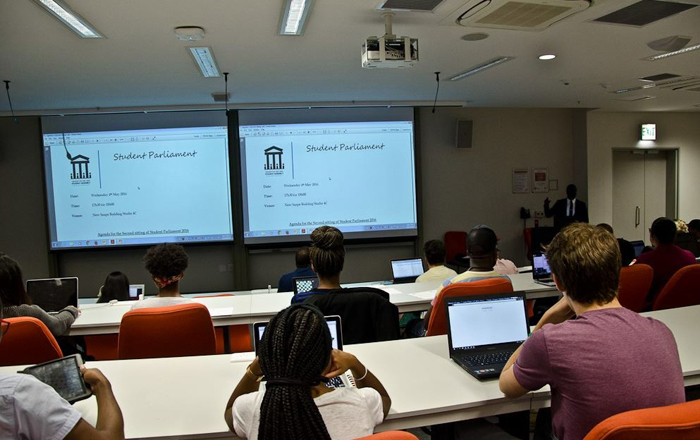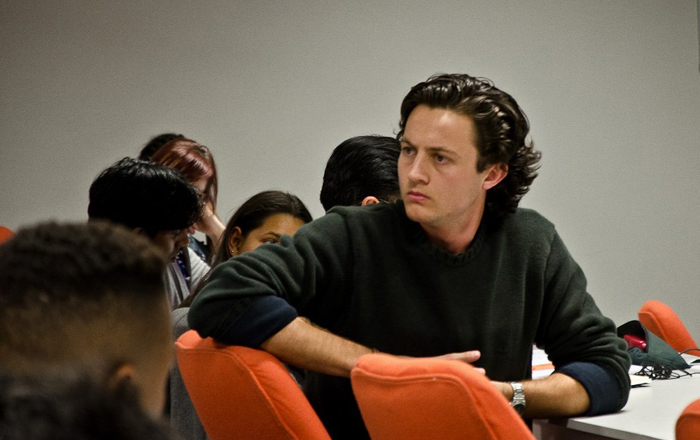Student Parliament addresses important student issues
24 May 2016 | Story Chido Mbambe. Photos Wandile Kasibe.
Student Parliament, the forum for discussing student issues and holding the Students' Representative Council accountable, recently gathered at the New Snape Building to address issues faced by students in the university. The agenda included UCT's strategic plan, the new SRC constitution, safety on campus, and Jammie Shuttles.
This sitting of Student Parliament was well attended with 87% of the members present.
“This was testament to the hard work put in by the Student Parliament Management Committee, which is committed to making Student Parliament more effective and a legitimate decision-making forum for the benefit of the UCT student body,” said Chanda Chungu, the deputy speaker of Student Parliament.
Vice-Chancellor Dr Max Price presented the draft strategic plan for 2016–2019, highlighting the main focus areas: institutional culture, Africa and international, engaged scholarship, graduate attributes and research. The strategic plan will be sent to Senate in June and to Council by the end of June for sign-off and will guide the university over the next four years.
Keenan Hendrickse raised the point that the process of drafting the strategic plan needs to be reviewed. Instead of engaging only UCT staff and management in defining a strategic plan, he argued that there should be engagement with students in addressing the complexity of student issues. It was also argued that students should be given platforms from which to give their input to the drafting of the strategic plan.
Rhodes Must Fall member Wandile Kasibe enquired directly about the students who are currently facing exclusion and disciplinary action. He questioned why their contribution as student voices is contradicted by their exclusion from such meetings, especially when considering that they played an integral part in contributing to transformation in the university.
In response, the VC concurred that the students' contribution was relevant, but emphasised that their contribution in protesting could not be accompanied by illegal conduct. The process of student input has not been compromised, however, as other students and student bodies have contributed, and are still contributing, towards the draft strategic plan.
Dominic Schorr, chairperson of the Engineering and the Built Environment undergraduate faculty council, questioned why the word “decolonisation” is not prominent in management's communication of the strategic plan.
 Dominic Schorr, chairperson of the Engineering and the Built Environment undergraduate faculty council, listens to points raised by fellow Student Parliament members.
Dominic Schorr, chairperson of the Engineering and the Built Environment undergraduate faculty council, listens to points raised by fellow Student Parliament members.
Dr Price referred to an article he wrote with Dr Russell Ally, which looked at whether decolonisation and transformation are contradictory or whether they can be reconciled.
“We argue that they can be reconciled and transformation has a much broader scope, whereas decolonisation has elements of it,” explained Price. “If we focus only on decolonisation, we would talk about a very limited element of transformation at UCT, and therefore it is appropriate to talk about transformation in general.”
Dr Price closed off the strategic plan discussion by stating that the university is open to criticism and discussion on ways to make the plan more effective.
Other matters addressed were the new draft of the SRC Constitution, which received Student Parliament endorsement and was approved unanimously by the house. Student Parliament was given an opportunity to question the SRC on its activities and students raised issues related to funding and representation on university committees.
Campus safety was also discussed. Tayla Karsten, the SRC chair of health and safety, is expected to bring feedback on proposed self-defence classes, improving the blue routes, the SRC safety app and its stages of implementation, and the introduction of the UCT student helpline in conjunction with the Student Wellness Service and the South African Depression and Anxiety Group.
Chungu pointed out that Student Parliament has taken measures to transform the parliament from merely discussing issues to making decisions on how to address the issues. He emphasised that an oversight subcommittee made up of representatives from each sector of student governance had been set up in order to hold the SRC accountable. The subcommittee is scheduled to hold meetings more than four times a year and will ensure that Student Parliament is more effective.
A constitutional and satellite campus subcommittee has also been set up to address issues relating to satellite campuses and a task team has been established to assess Jammie Shuttles, parking and satellite campus issues.
Chungu also said that the SRC should work with the Student Parliament subcommittees and task teams in order to serve students more effectively.
 This work is licensed under a Creative Commons Attribution-NoDerivatives 4.0 International License.
This work is licensed under a Creative Commons Attribution-NoDerivatives 4.0 International License.
Please view the republishing articles page for more information.










